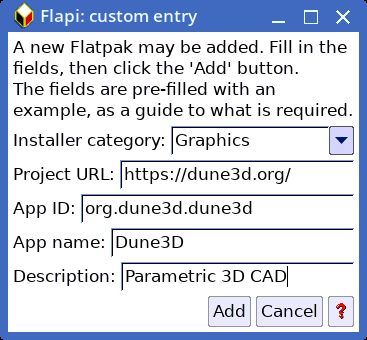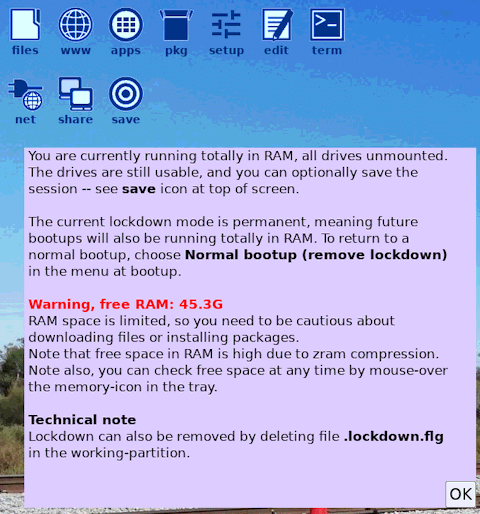Dune3D parametric CAD added to Flapi
Easy, using the "Customize" button:

This will be in the next release of Flapi.
Homepage:
Tags: easy
sdparm and sg3-utils compiled in OE
I have compiled 'sdparm' and 'sg3-utils' packages in OpenEmbedded, and added to the Easy Scarthgap package repository. You can install via PKGget, after updating the package database, or download directly:
https://distro.ibiblio.org/easyos/amd64/packages/compat/oe/scarthgap/
sg3-utils has a utility that can detect if a drive supports TRIM,
in cases where other methods fail. I will experiment with
this.
Tags: easy
hdparm updated in initrd
The initrd has the binary executable 'hdparm' statically-linked with musl, version 9.58. Caramel has observed that a later version, in the main Easy filesystem, 9.65, seems to be better behaved:
https://forum.puppylinux.com/viewtopic.php?p=141941#p141941
I have compiled hdparm 9.65 statically-linked with musl, in OE. Actually, this is an old version of OE, from the EasyOS Pyro-series, that I keep for musl static compiles. Here is the binary:
https://github.com/bkauler/woofq/tree/main/easyos/easy-arch/amd64/target/boot/initrd-tree/bin
This does need some more investigation. The 'hdparm' utility has
worked for me, but all of my USB drives are pendrives or SATA
SSDs, or SATA HDDs. The problem may be with a NVME SSD in a USB
caddy. So, I will investigate 'sg3-utils' to get around the
limitation of 'hdparm'.
Tags: easy
Linux 6.6.75 kernel compiled
EasyOS Scarthgap and Daedalus series have used the 6.6.x kernel,
up until recently. Scarthgap 6.6 has the 6.12.11 kernel and 6.6.1
has the 6.12.12 kernel.
- Linux kernel 6.12.12 configured without AVS and Xe — February 03, 2025
It has put me in a quandary, as the AVS audio driver does not work (it loaded on my Acer Aspire 1 but no sound, whereas legacy driver works), and the 6.12 kernel has removed many legacy audio drivers, forcing us to in some cases use AVS. Which is bad if the fallback legacy driver is no longer there.
I would like to rollback to a LTS kernel before 6.12, but
unfortunately that is 6.6. The inbetween, 6.8, 6.9, 6.11, are all
EOL.
But there is good news. Although kernels after 6.6 have improvements for the Intel Core Ultra 7 and Ark GPU, I have compiled 6.6.75 and video and sound now both work on my Asus Zenbook S13. This is using the i915 video driver and legacy audio driver.
So, going to stay with the 6.6.x kernel for Scarthgap, and
probably Daedalus also. For now anyway.
Although I want EasyOS to work on recent laptops, the main focus
is that Easy will work on older computers, right back to the very
first with 64-bit CPU. I want all the legacy
drivers.
Tags: easy
Fix unmute when boot different audio hw
I was reminded of this problem when testing booting Easy
Scarthgap 6.6.1 from USB-stick on my collection of computers.
At the very first bootup, script /usr/bin/delayedrun unmutes the
audio and sets a level of 80%. That's good, but then bootup on
other computers and the audio icon in the tray shows as muted,
with level 8%, then requires manual unmute and set level.
This is now fixed. Bootup on a different computer for the first time, and audio is unmuted and set to 80%. See commit:
https://github.com/bkauler/woofq/commit/805604c9e9cffcaedbe923fae25e21fdb8f4eede
Tags: easy
EasyOS Scarthgap-series version 6.6.1 released
Version 6.6 was release on January 29, 2025:
- EasyOS Scarthgap-series version 6.6 released — January 29, 2025
And the Daedalus-series version 6.5.7 also on January 29:
- EasyOS Daedalus-series version 6.5.7 released — January 29, 2025
Here are the highlights of Scarthgap 6.6.1, relative to 6.6:
- Global IP TV Panel updated to 2024MK10 — February 03, 2025
- Lockdown and disable drives fix — February 03, 2025
- Linux kernel 6.12.12 configured without AVS and Xe — February 03, 2025
- Intel sound avs driver still too immature — February 02, 2025
- More Russian translations — January 31, 2025
- Fix again snapshots saving /var — January 31, 2025
The 6.12.12 kernel with completely disabled audio AVS and video Xe drivers, is an experiment. OK on my computers, except for my Zenbook laptop Xorg did not start, and had to run 'xorgwizard'; chose "modesetting" driver and let Xorg choose the resolution, then Xorg worked. Don't know why didn't work first go, whereas the 6.12.11 kernel did.
Then there is AVS. In the 6.12 kernel apparently some legacy audio drivers have been removed, intended to be replaced by AVS. Let me know if audio fails on your computer.
Download:
http://distro.ibiblio.org/easyos/amd64/releases/scarthgap/2025/6.6.1/
...which also has release notes and getting-started readme.
Fast mirror in Europe:
https://ftp.nluug.nl/os/Linux/distr/easyos/amd64/releases/scarthgap/2025/
Feedback welcome at the forum:
https://forum.puppylinux.com/viewtopic.php?p=141926#p141926
have fun!
Tags: easy
Global IP TV Panel updated to 2024MK10
Forum member ETP created and maintains this, see forum:
https://forum.puppylinux.com/viewtopic.php?t=689
He has to update often, as the URLs change. I am grateful for the
time he puts into doing this, as I sometimes watch a streaming TV
channel. It is good to have a selection of different political
viewpoints, such as CGTN (Chinese English news) and Sky News
(Western right-wing). Ha ha, "Western right-wing" is an
understatement.
Tags: easy
Lockdown and disable drives fix
EasyOS has the capability of booting up running totally in RAM with the drives disabled. There are actually two types; not actually disabled, just all unmounted, and secondly truly disabled. There is an introductory webpage:
"Ultra-secure web browsing"
https://easyos.org/user/ultra-secure-web-browsing.html
Alfons reported a problem with lockdown, that turned out to not be a problem; however, while testing lockdown I noticed something else -- the "save" icon was missing from the desktop. The original "update" icon was there, but it was supposed to be replaced by a "save" icon.
Booting up in lockdown mode, there is an information window, and the "save" icon should be there, like this:

Testing on my Lenovo Ideacentre which has 32GB RAM. That free
space of 45.3GB is due to running in /dev/zram0 in RAM, which has
a compressed ext2 filesystem.
I fixed it, so the "save" icon is back:
https://github.com/bkauler/woofq/commit/ee7f748794756f72e22a789f27f66859bf39bd72
Hmmm, this bug has been there since usr-merge was implemented in Easy. I wonder how many people tried EasyOS lockdown mode, it didn't work properly and they just moved on, without reporting it. Or maybe lockdown mode hasn't attracted any attention.
Changing the subject, when there is a change of kernel, some files in /usr/lib/modules get left behind. Just a tidyup, removing them:
https://github.com/bkauler/woofq/commit/dd70ac336358c6cc4e44b9d67c4064c2e5d613d5
Tags: easy
